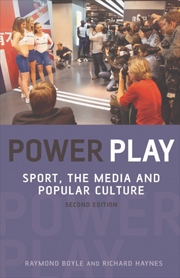Book contents
- Frontmatter
- Contents
- Miscellaneous Frontmatter
- Preface
- Acknowledgements
- 1 Sport, the Media and Popular Culture
- 2 All Our Yesterdays: A History of Media Sport
- 3 A Sporting Triangle: Television, Sport and Sponsorship
- 4 Power Game: Why Sport Matters to Television
- 5 Who Wants to Be a Millionaire? Media Sport and Stardom
- 6 The Race Game: Media Sport, Race and Ethnicity
- 7 Playing the Game: Media Sport and Gender
- 8 Games Across Frontiers: Mediated Sport and National Identity
- 9 The Sports Pages: Journalism and Sport
- 10 Consuming Sport: Fans, Fandom and the Audience
- 11 Conclusion: Sport in the Digital Age
- Bibliography
- Index
2 - All Our Yesterdays: A History of Media Sport
Published online by Cambridge University Press: 05 August 2013
- Frontmatter
- Contents
- Miscellaneous Frontmatter
- Preface
- Acknowledgements
- 1 Sport, the Media and Popular Culture
- 2 All Our Yesterdays: A History of Media Sport
- 3 A Sporting Triangle: Television, Sport and Sponsorship
- 4 Power Game: Why Sport Matters to Television
- 5 Who Wants to Be a Millionaire? Media Sport and Stardom
- 6 The Race Game: Media Sport, Race and Ethnicity
- 7 Playing the Game: Media Sport and Gender
- 8 Games Across Frontiers: Mediated Sport and National Identity
- 9 The Sports Pages: Journalism and Sport
- 10 Consuming Sport: Fans, Fandom and the Audience
- 11 Conclusion: Sport in the Digital Age
- Bibliography
- Index
Summary
Sport … is probably the biggest thing in the land. It occupies the thoughts, and empties the pockets, of countless millions.
(Trevor Wignall, sports journalist, Daily Express, 1936)A glance at the world showed that when the common people were not at work, one thing they wanted was organised sports and games.
(James, 1963/83: 153)Introduction
Mediated versions of sport are one of the key areas of culture which give us a sense of a lived history. One of the particular appeals of sport, for both the media and supporters, is the extent to which the narratives or stories which surround sport act as a bridge between the present and the past. Sporting events need to have a history and a longevity to feel important. In Australia, international cricket is dominated by the Ashes series with England, a competition given extra impetus by the long rivalry between these two countries. As we argue in Chapter 4, television increasingly helps to create – and at times even invent – this historical dimension for more recent sporting events. However, it is important that we have some historical perspective on the institutional relationship that has evolved between the media and sport, particularly as it is the former that has told the history of sport for much of the twentieth century.
- Type
- Chapter
- Information
- Power PlaySport, the Media and Popular Culture, pp. 19 - 42Publisher: Edinburgh University PressPrint publication year: 2009



